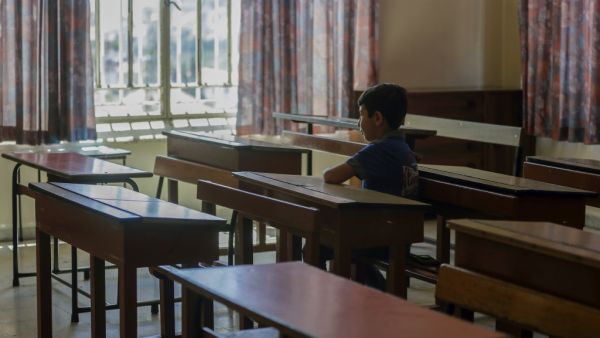Almost 10 million children out of school worldwide due to the coronavirus pandemic may never return to a classroom, a new report published Monday by an international children's humanitarian aid organization said, warning the world is facing an unprecedented and "hidden education emergency."
In the 94-page report Save Our Education published by the Save the Children Fund, the London-based organization said that by early April more than 1.6 billion students, or 91 percent of all students worldwide, had stopped going to school as their doors shuttered to stymie the spread of COVID-19, which has infected nearly 13 million people resulting in more than 569,000 fatalities, according to Johns Hopkins University.
ADVERTISEMENT
The schools closed as governments the world over instituted varying degrees of lockdown, which has thrust the global economy toward a recession. By the end of this year, global gross domestic product is forecast to shrink 7.6 percent, the Organization for Economic Co-operation and Development said last month.
This recession could create a $77 billion shortfall in education spending in the world's poorest countries over the next 18 months. In a worst-case scenario, that figure could be $192 billion by the end of 2021, according to the report's estimations.
These deep budget cuts to education and rising poverty caused by the virus could cause some 9.7 million students to never return to school with millions more falling behind in their education, the report said.
Children in low-income countries, in refugee camps and in conflict zones, but especially females in those environments, are at high risk of never returning to school, the report said, as each day that passes they become more vulnerable to hunger, violence, child labor and child marriage.
"This is an unprecedented education emergency and governments must urgently invest in learning," Inger Ashing, CEO of Save the Children, said in a statement that accompanied the report. "Instead, we are at risk of unparalleled budget cuts, which will see existing inequality explode between the rich and the poor and between boys and girls."
Children in Afghanistan, Chad, Cote d'Ivoire, Guinea, Liberia, Mali, Mauritania, Niger, Nigeria, Pakistan, Senegal and Yemen face the greatest risk of never returning to school while those in another 28 countries have been labeled at either high to moderate risk of not continuing with their education, the report said.
Children in these countries face the greatest risk of being subjected to forced child labor while adolescent females may suffer from gender-based violence, child marriage and pregnancy, the researchers said, adding that the longer they are out of school the greater that risk becomes.
Last month, UNICEF warned that millions of children could be forced into low-paying and dangerous jobs, potentially leading to the first rise in child labor in at least two decades.
"If we allow this education crisis to unfold, the impact on children's futures will be long-lasting. The promise the world has made to ensure all children have access to a quality education by 2030 will be set back," Ashing said, referring to one of the United Nations' Sustainable Development Goals to ensure all children have access to free, equitable and quality primary and secondary education by the next decade.
To right this situation, the report calls on governments and donors to invest in education while urging commercial creditors to suspend debt repayments to low-income countries that could make some $14 billion available for education investments.
Specifically, it calls on the World Bank to provide $35 billion to fund the return to school by making them safe and inclusive with access to school meals and health services.
"It would be unconscionable to allow resources that are so desperately needed to keep alive the hope that comes with education to be diverted into debt repayments," Ashing said. "Governments should be putting the interests of children before the claim creditors."
This article has been adapted from its original source.








